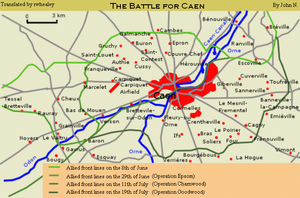Battle for Caen
| Battle for Caen | |||||||
|---|---|---|---|---|---|---|---|
| Part of Operation Overlord | |||||||
 Battle for Caen |
|||||||
|
|||||||
| Belligerents | |||||||
|
|
|
||||||
| Commanders and leaders | |||||||
|
|
|
||||||
| Strength | |||||||
| 3 armoured divisions 11 infantry divisions 5 Armoured Brigades 3 Tank Brigades |
7 infantry divisions 8 Panzer divisions 3 heavy tank battalions |
||||||
| Casualties and losses | |||||||
| c. 50,539 casualties | Unknown 550 tanks |
||||||
The Battle for Caen from June–August 1944 was a battle of the Second World War between Allied forces of the mainly Anglo-Canadian Second Army and German forces of Panzergruppe West during the Battle of Normandy. The Allies aimed to seize Caen, one of the largest cities in Normandy on D-Day. Caen was an important Allied objective because it lay astride the Orne River and Caen Canal; these two water obstacles could strengthen a German defensive position if not crossed. Caen was a road hub and the side which held it could shift forces rapidly. The area around Caen was open, compared to the bocage country in the west of Normandy and was valuable land for airfields.
On D-Day, 6 June 1944, Caen was an objective for the British 3rd Infantry Division. Caen became the focal point for a series of armoured battles from June to August. The battle for Caen lasted for two months, because most of the German armoured divisions were used to hold the Caen sector. The Germans in the Caen sector deployed 1,358 tanks in June, including 135 Tigers and 405 Panthers, 40 percent of the total. So much effort was focused on the Caen sector the Germans in June fielded only 40 assault guns and a handful of obsolete French tanks in the American sector.
The British and Canadian forces ground up the German armour, enabling the American forces to break out. Light German forces facing the Americans thrust further west being spread too thinly. They relied on the rough terrain of the back country to slow down the American advance up to the break out operation, Operation Cobra. With so many German divisions committed to defending Caen against the British and Canadians, the American forces eventually broke through to the south and east, threatening to encircle the German armies in Normandy. The old city of Caen—with many buildings dating back to the Middle Ages—was destroyed by Allied bombing and ground fighting. The reconstruction of Caen lasted until 1962 and little of the pre-war city remains.
...
Wikipedia
